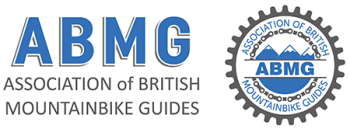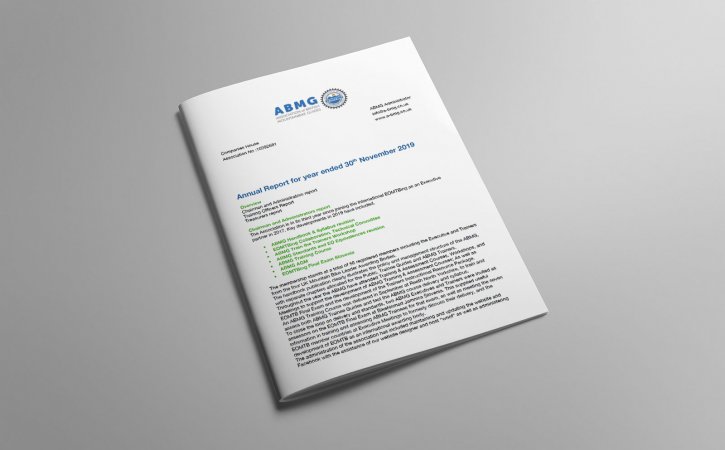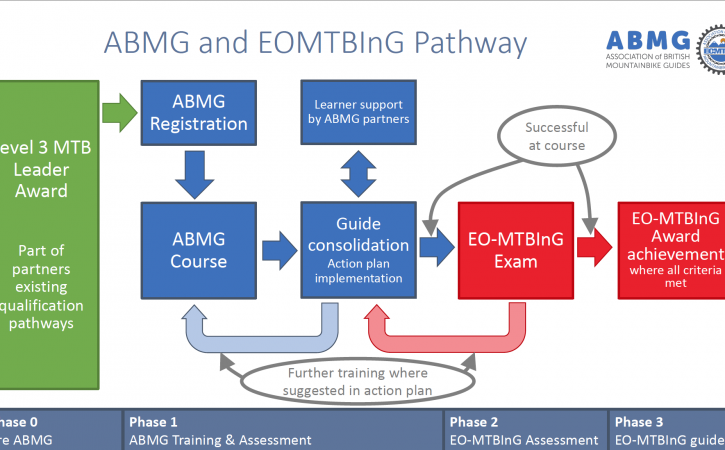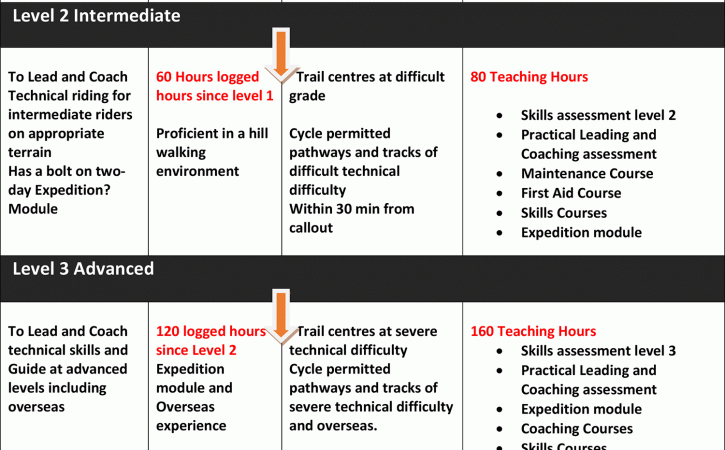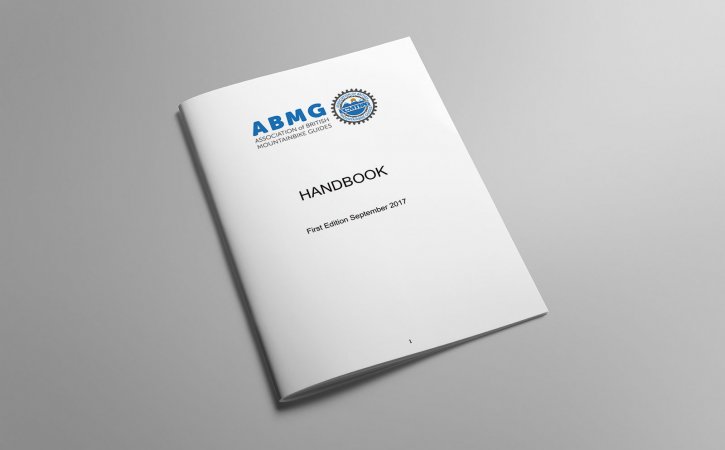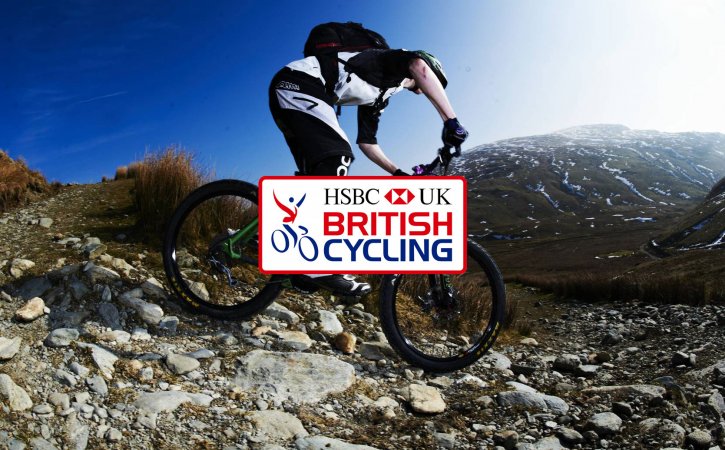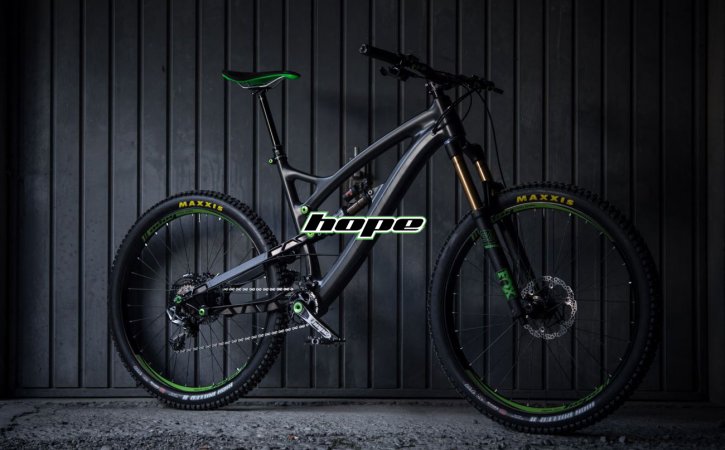We’re pleased to present the The ABMG Annual Report for 2023.
ABMG News
ABMG Weekend by Andy Barlow, Dirt School
At Dirt School we spend a lot of time watching the best riders in the world and working out how they are able to gain the control that allows them to go so fast. We then work out different ways to communicate those techniques so that our clients can feel more confident on the trails. As a team we’re always looking to progress our own riding ability and communication techniques, and every now and again an opportunity to improve as a leader emerges.
The Association of British Mountainbike Guides (ABMG) is made up of MBCUK, British Cycling, MIAS and Cycling UK – basically all the leadership and coaching qualification providers in the UK, and in turn is a member of the European Organisation of MTB Instructor-Guides (EO-MTBInG), which represents the mountain bike leader community on an international level. The amount of work that’s gone in to bring so many organisations together, not only in the UK but in Europe as well, is staggering, and as a result of all this hard work the ABMG is now a stand alone guiding qualification in the UK – as well as entry into the European International qualification.
After a quick chat with Chip Rafferty, the Managing Director at MBCUK mountain bike coaching, about what would be covered over the weekend, I was booked onto the ABMG Training and Assessment course and was heading down to Reeth in the Yorkshire Dales. This course looks at candidates suitability for the European EO-MTB Guides Scheme, and lays out a clear action plan for candidates to follow so that they can feel confident going into the assessment – this year in October in France.
The three day course covers everything from leadership to coaching. It looks at first aid scenarios, complicated navigation, the risks involved in operating at altitude or in remote locations, and tests candidates’ fitness levels over long, arduous days. As you would expect from a qualification at this level it attracted a group of experienced guides and coaches who were all professional leaders and were looking to continue to improve.
Chip kicked the day off with a presentation about what we would be covering in the next few days. We looked at what was involved in being a leader, and had an open discussion about what your responsibilities and risks are with a group on the hill. It was great to be in such good company and everyone in attendance had something to contribute.
Straight away we were put to the test with an orienteering challenge. I’ll be honest, this is the weakest part of my own game, and the only part I was dreading. At Dirt School we tend to operate in the same local areas in the Tweed Valley, and would only ever lead a group somewhere that we’d already sussed out beforehand. Part of the EO-MTBInG qualification, however, is testing your ability to navigate in terrain that you’ve never seen, so being thrown in at the deep end was a great way of getting stuck in. We had 60minutes to find 8 checkpoints, so we all set off in opposite directions with 5min gaps. It’s safe to say that I was out of my comfort zone and had to go into full-on ‘race mode’ to really focus on the challenge in hand. 55min later I was back at HQ with all 8 checkpoints – something I never thought I’d be able to achieve at the start of the day. It looked like my navigation wasn’t as bad as I thought.
During lunch we had a discussion about the coaching elements of the qualification and once we’d all finished, moved outside for another practical session this time on communication. We were introduced to the coaching aids and given enough time to become familiar with the terrain. I really appreciated the open learning environment that the leaders in charge managed to create here, and again, given the experience of everyone in attendance, it was good to be able to share experiences and talk about what different communication techniques make a good coach. Another successful session.
After a quick break we were right into the slow speed test. This was basically a trials course with 4 stages and no dabs. A bit old school but a great test of someone’s riding ability. After doing 2 full clean laps in practice I dabbed under assessment on the first stage! I had a quick word with myself and made it round the rest of the course clean. Still a pass but a bit embarrassing to not be able to ace the very test I should be the strongest in. The course was a great mix of technical rocks and tight corners, and steep chutes with loose surfaces. A real test of even an experienced mountain biker’s ability.
In the evening we looked at the Business Plan that is part of the qualification. This might seem like a bit of an irrelevant exercise for a mountain bike qualification, but most of the problems that occur from leaders operating in places like France is actually how the tax is paid, the grey areas in insurance, and the fine print of employment law abroad. In short, it’s actually a really good thing to have as part of a qualification at this level as it tests whether candidates are up to speed in how to properly run a business overseas.
The following day we were all put to the test with a predetermined route that we all had to take turns guiding. We’d be out all day and it was as much a test of our ability to think when tired as it was our navigation skills. The day also included a timed segment that none of us had ridden before. This was to assess our ability to handle the pressure of leading a group of capable riders over demanding terrain.
Fortunately this is something that we do a lot of at Dirt School, so I leaned heavily on the pacing and process based goals that we cover in any of our more advanced courses. A great course was laid out by Joe and we all got down safely. When it was my turn to guide though, again I felt out of my comfort zone. By now it was clear that this was something that I would likely have in my action plan before the big assessment in France. Basically I need to read more maps. No mistakes were made though and I passed successfully. The day also included first aid scenarios and trail side repairs. A lot to fit in but spread out over the full day it felt natural. After such a long day we all went out for a meal at the local restaurant. A great way to recap on a brilliant loop in the Yorkshire Dales.
The final day was all about coaching. We were split into groups and had a good discussion with our partners about what we’d like to cover and what they’d like to get out of the session. Again, this was a very open learning environment, and although there were clear goals set out for us, it never felt forced or like we were really under too much pressure. The open discussion that happens with a group of leaders like this is something that very few of us get to have regularly, and again it was great to be able to share experiences and methods with new people. Once the assessments started it was business as usual, and we all delivered our sessions with confidence.
All in all the ABMG weekend is a great way of covering everything that you need in order to be able to operate internationally as a capable mountain bike leader. It brings all the key elements of coaching, leading, incident management, planning and riding ability together in one package and is well worth considering if you want to operate professionally as a confident leader.
The New ABMG Handbook
We’re pleased to present the “Introduction” to the first Edition of the ABMG Handbook (Full Handbook available to ABMG Members)
Download the Introduction” to the first Edition of the ABMG Handbook.
ABMG partner with British Cycling (BC)
British Cycling (BC) has recently joined the Association of British Mountainbike Guides ABMG. Partnering with the three other leading mountain bike awarding organisation’s; Mountain Bike Coaching UK (MBCUK), Cycling UK, and the Mountain-Bike Instructors Award Scheme (MIAS), to boost the MTB guides industry across Europe.
ABMG partner with Hope
The ABMG Guides Scheme are pleased to announce that Hope Technology have been chosen and agreed to be their “bike industry headline partners”.
Chip Rafferty ABMG Chairman said, that in choosing Hope “ABMG are partnering a brand that is a flagship of the British Cycling Industry, and supports the high standards of the Internationally recognised ABMG award.”
